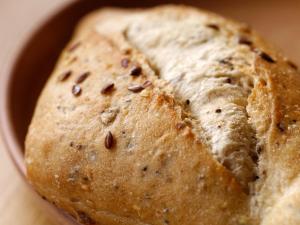I was a recent divorcee, and we were traveling to meet the family of the man with whom I was “the other woman.” Everyone had been gracious from afar, but I knew that his mom had been on the other side of infidelity and I worried that grace might be a little frosty in person. Perhaps there was forgiveness for the son, but not for the home wrecker girlfriend.
In the weeks leading up to Thanksgiving, I kept pestering Rich, asking what we could take to dinner. I was nervous about making a good impression. I knew that his mom was accomplished in the kitchen, while I was coming from a season of limited cooking. In my first marriage, I had all but given up preparing home-cooked meals, relying instead on prepackaged food to feed my family. With Rich’s encouragement, I was beginning to stretch my culinary wings a bit, but preparing anything for his mom, my eventual mother-in-law, felt like a test that I was destined to fail.
 We finally decided that we would take bread and salad. We made two loaves of bread, made some compound butters, and bought the ingredients for a Caprese salad with a balsamic reduction. I knew it wasn’t enough. In light of a turkey and mashed potatoes and homemade cheesecake, what were a couple loaves of bread and some mozzarella, tomato, and basil leaves? It wouldn’t be enough.
We finally decided that we would take bread and salad. We made two loaves of bread, made some compound butters, and bought the ingredients for a Caprese salad with a balsamic reduction. I knew it wasn’t enough. In light of a turkey and mashed potatoes and homemade cheesecake, what were a couple loaves of bread and some mozzarella, tomato, and basil leaves? It wouldn’t be enough.
I wouldn’t be enough.
The truth was, I wanted to take something that might cover my inadequacies as a cook, but also as a potential wife, as a mother. Something to prove that I was more than an adulteress. It was my first major holiday apart from my children, the first Thanksgiving in years that I wasn’t spending with my parents, and I longed to be accepted as a part of this family—to have a place in this home during a season when I felt displaced in so many areas.
As mealtime approached, my nerves increased. Rich’s brother and sister-in-law had welcomed me to their brand-new home warmly, even if the heater wasn’t working properly. But I was still waiting to meet the woman who had given birth to the man whose hand I was currently clutching. Our meager offerings to the Thanksgiving feast looked as small as I felt.
We heard the Jeep pull up the driveway and I could feel my heartbeat quicken. We should take the bread and go. Go before she had a chance to look at me and disapprove.
She came through the door, and her sons went to give her a hug. I stayed back to give them an opportunity to say hello, then she made her way over to me.
And she embraced me.
The rest of the day, we sat in the kitchen, cutting up potatoes together, tasting the balsamic reduction that Rich made, laughing, telling stories. I had a piece of her cheesecake, she had a piece of our bread.
Everything was delicious. Everything was enough.
* * * * *
 “Enough” was written by Alise Chaffins. Alise is a wife, a mother, an eater of soup, and a lover of Oxford commas. You can generally find her sitting behind a keyboard of some kind: playing or teaching the piano, writing at her laptop, or texting her friends a random movie quote. She lives in West Virginia and blogs at knittingsoul.com
“Enough” was written by Alise Chaffins. Alise is a wife, a mother, an eater of soup, and a lover of Oxford commas. You can generally find her sitting behind a keyboard of some kind: playing or teaching the piano, writing at her laptop, or texting her friends a random movie quote. She lives in West Virginia and blogs at knittingsoul.com

